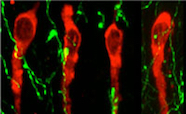How does the brain control reproduction?

The hormones that are responsible for the onset of puberty and fertility are controlled by the brain. They also control the changes in a mother's body during pregnancy and breastfeeding. The Centre for Neuroendocrinology (CNE) has a strong focus on understanding the neural processes involved in controlling reproduction starting with the ability to be fertile and going right through to the complex process of motherhood.
Neural regulation of fertility
Some of the most important hormones for reproduction are produced by the brain. These include the hormones responsible for triggering puberty, and the production of the egg and sperm. It's estimated that around one third of fertility problems result from abnormalities in the brain regulation of the ovary and testis. To find a solution to these issues we first need to understand how the brain controls these hormones.
The key questions we're examining in CNE around the neural regulation of fertility are:
How do GnRH neurons control puberty and adult fertility function?
How does nutrition and metabolism impact on fertility?
How is the brain involved in polycystic ovary syndrome (PCOS)?
How does engaging in reproduction influence future fertility, metabolic health and ageing?
What causes infertility in conditions like hyperprolactinaemia?
What role does kisspeptin play in early pregnancy?
Neural control of birth and lactation
Feedback between the body and the brain stimulate, and regulate, birth and lactation. But how does the brain receive and implement the information from the body? And in the case of preterm birth, what has gone wrong and how can we predict or prevent it? These are all questions being asked by our researchers, as they try to explain the ways in which the body and brain work together to control birth and lactation.
Some of the other questions we're examining around the neural control of parturition and lactation include:
How does the brain control birth?
How does the brain control lactation?
The maternal brain
Pregnancy causes a myriad of changes, to both the body and the brain. Pregnant women report mood swings, mental fogginess, sleep and dream changes, increased appetite, as well as the host of physical changes and metabolic changes happening throughout the pregnancy. All of these issues are driven by hormonal changes throughout pregnancy but which hormones are involved and the mechanisms by which these hormones act is currently unknown.
Two of the questions we're examining in relation to the maternal brain are: